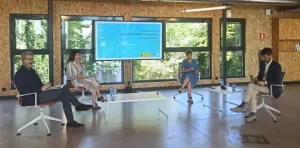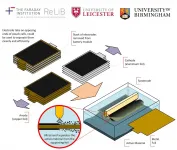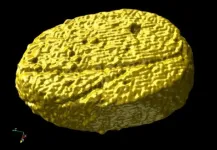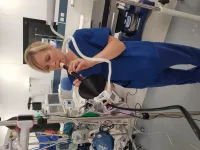(Press-News.org) FECYT - Spanish Foundation for Science and Technology - presented today at the headquarters of the National Museum of Science and Technology, MUNCYT, IN Alcobendas, the results of the third Social Perception Survey of scientific aspects of the COVID-19 in a debate moderated by Pampa García Molina, Editor-in-Chief of the SINC Agency, in which Raquel Yotti, Director of the Carlos III Health Institute of Madrid, Josep Lobera, Professor of Sociology at the Universidad Autónoma de Madrid (UAM) and scientific director of the Social Perception Survey on the scientific aspects of COVID-19 and Pablo Simón, Professor of Political Science at the Carlos III University of Madrid, took part.
The results of this third survey correspond to interviews conducted by telephone with 2,100 individuals from 3 to 21 May 2021 and measures the evolution of vaccine reluctance and its associated social factors. The study with the results of this third survey was also presented during the event and is available on the FECYT website.
The first survey was conducted between 25 June and 15 July 2020 and the second between 4 and 22 January 2021. With the results obtained from both, the report Evolución de la percepción social de aspectos científicos de la COVID-19 (Evolution of Social Perception of Scientific Aspects of COVID-19) was produced.
This series of surveys has been conducted for the FECYT by Professor Josep Lobera (Universidad Autónoma de Madrid) with the collaboration of researcher Pablo Cabrera (Universidad de Salamanca).
Attitudes towards vaccination
Results of the study show that the uptake of covid-19 vaccines consolidates the improvement initiated in January 2021. In July 2020, only one third of the population (32%) expressed with full confidence their intention to be vaccinated as soon as a vaccine was offered by health authorities. In January, that proportion increased to 58% and, in May, it has reached 83% (adding those already vaccinated and those fully confident of doing so).
The main factors associated with reluctance to vaccinate are the belief that vaccines are unsafe, complacency (the perception that when the majority are vaccinated, vaccination is no longer necessary), individualistic values (measured as disengagement from "I would accept the coronavirus vaccine if it helps protect my elders") and the conspiracy mentality around covid-19.
Compliance with COVID-19 preventive measures
Results show a certain relaxation in compliance with prevention measures, particularly in maintaining social distance. In May, only a third of the population (32%) said that they had strictly avoided social contacts in the last month, twenty points less than in January.
On the other hand, only half of the population (49%) say that they have avoided or have been able to strictly avoid being in enclosed spaces with other people outside their living environment. The main factors associated with non-compliance with prevention measures are: 1) non-compliance with the measures by their immediate social environment, 2) lack of trust in health institutions, 3) having a low level of education, and 4) being male. The quadratic effect of educational level points to a possible effect of living/working conditions on the maintenance of prevention norms. On the other hand, conspiracy mentality adds to the list of factors associated with mask use.
COVID-19 conspiracy theories
There is a significant percentage of people who believe in some conspiracy theories. One in four Spaniards (25%) strongly believe that there are secret organisations that strongly influence political decisions and only 17% strongly believe the opposite. Almost a third of the Spanish population (31%) believe that face masks are bad for their health and only 16% firmly believe that they are not. Nearly 8% strongly believe that vaccinating children is harmful, and this fact is hidden, while 35% strongly believe that this is not the case.
58% of the population declare they have seen or heard messages, through one or more media, encouraging people not to be vaccinated against the coronavirus. Twenty-seven per cent say they have heard or seen them on television, while 34% say these messages have come to them via a social network.
The main factors associated with having conspiratorial beliefs about covid-19 are: 1) a previous conspiratorial mindset about vaccines, 2) distrust of political institutions, 3) avoidance of mask use, 4) experiencing social difficulties associated with covid-19 containment measures, 5) being female, and 6) having a low level of education.
Technical data sheet of the survey:
Universe: individuals aged 18 and over resident in Spain for 5 or more years.
Sample size: 2,100 interviews.
Sampling: random selection of the interviewee with a sample stratified by the intersection habitat / autonomous community and distributed proportionally to the total of the region.
Method of data collection: computer-assisted telephone interview (CATI) using a structured and pre-coded questionnaire. The interviews were carried out in 75% of the cases by means of the interviewees' landline telephones and in the remaining 25% by means of their mobile telephones for people who did not have a landline telephone.
Data collection: computer-assisted telephone interview (CATI) using a structured, pre-coded questionnaire. The interviews were carried out in 75% of the cases through the landline phones of the interviewees and in the remaining 25% through their mobile phones for people who did not have a landline phone.
Sampling error: assuming the criteria and principles of simple random sampling, under the assumption of maximum sampling inefficiency due to the non-proportional distribution of the sample, for a confidence level of 95% and in the worst case scenario of maximum indeterminacy (p=q=50%), the margin of error for the total sample can be estimated at +-2.14%.
Fieldwork: between 3 and 21 May 2021.
INFORMATION:
About FECYT
Fundación Española para la Ciencia y Tecnología, F.S.P. (FECYT), (Spanish Foundation for Science and Technology) is a public foundation under the Ministry of Science and Innovation. Thanks to this collaboration, FECYT works to strengthen the link between science and society through actions that promote open and inclusive science, scientific culture and education, responding to the needs and challenges of the Spanish Science, Technology and Innovation System.
Polymers are long, chain-like molecules which are everywhere in biology. DNA and RNA are polymers formed by many consecutive copies of nucleotides coupled together. When being transported within or between cells, these biological polymers must pass through nanometre-sized holes called "nanopores".
This process also underlies a rapidly developing method for analysing and sequencing DNA called nanopore sensing.
The study, published in the journal END ...
Researchers at the University of Leicester have developed a new method to recycle electric vehicle batteries using a ground-breaking new approach that many will have experienced in the dentist's chair.
The Faraday Institution project on the recycling of lithium-ion batteries (ReLiB) led by Professor Andy Abbott at the University of Leicester used a new method, involving ultrasonic waves, to solve a critical challenge: how to separate out valuable materials from electrodes so that the materials can be fully recovered from batteries at the end of their life.
Current recycling ...
A new corona test developed at the University Hospital Bonn can analyze a large number of swabs simultaneously using sequencing technology and has a similarly high sensitivity as the common qPCR test. The innovative method offers great potential, especially for systematic testing in daycare centers, schools or companies. Today, the results of the study on the new Corona test have been published in the renowned journal "Nature Biotechnology".
Bonn, 6/29/2021 - In addition to vaccination, systematic testing of the population remains of central importance in order to effectively monitor and contain the spread of infections during the Coronavirus pandemic. Only in this way can the spread of the virus be effectively monitored and ...
Crystallization is one of the most fundamental processes found in nature - and it's what gives minerals, gems, metals, and even proteins their structure.
In the past couple of decades, scientists have tried to uncover how natural crystals self-assemble and grow - and their pioneering work has led to some exciting new technologies - from the quantum dots behind colorful QLED TV displays, to peptoids, a protein-mimic that has inspired dozens of biotech breakthroughs.
Now, a research team led by scientists at the Department of Energy's Lawrence Berkeley National Laboratory (Berkeley Lab) and UC Berkeley has developed a nanoparticle composite that grows ...
The electronic properties of graphene can be specifically modified by stretching the material evenly, say researchers at the University of Basel. These results open the door to the development of new types of electronic components.
Graphene consists of a single layer of carbon atoms arranged in a hexagonal lattice. The material is very flexible and has excellent electronic properties, making it attractive for numerous applications - electronic components in particular.
Researchers led by Professor Christian Schönenberger at the Swiss Nanoscience Institute and the Department of Physics at the University of Basel have now studied how the material's ...
Mineral resources from Chile are of great importance to Germany. According to statistics from the World Bank, thousands of tons of valuable minerals are imported from the South American country every year, including raw materials for lithium-ion batteries. But their extraction causes ecological and social problems: "The use of the limited freshwater resources in northern Chile for mining regularly fuels conflicts with the local population," says Professor Thomas Kohl from KIT's Institute of Applied Geosciences (AGW). "Northern Chile is one of the driest regions on earth, but has extensive geothermal resources. With a novel type of plant, it is not only possible to generate electricity in a climate-friendly way, but also to extract ...
When positioned strategically, garment seams sewn with conductive yarn can be used to accurately track body motion, according to computer scientists at the University of Bath in the UK. Best of all, these charged seams are able to respond to subtle movements that aren't picked up by popular fitness trackers, such as watches and wristbands.
In a new study, the Bath researchers found that clothing made with conductive seams can be analysed to identify the wearer's movements.
PhD student Olivia Ruston, who presented the work at the ACM Designing Interactive Systems conference this month, said: "There are lots of potential applications for conductive yarn in any activity where you want to identify and improve ...
Mice are an important animal model of human vision due to the powerful genetic tools available in this species. However, mouse vision was thought to be different to that of humans because humans have a region of the retina specialized for fine details called the 'fovea' whereas mice do not. Researchers from the Netherlands Institute of Neuroscience (NIN) have shown that the visual cortex of mice does contain a region of enhanced visual sensitivity dubbed the 'focea', making the mouse a better model of human vision than previously expected. The findings were published ...
Lithia, Florida -- June 29, 2021 -- Surgical resident training has traditionally occurred in a master-apprentice-type relationship, with graduated responsibilities until trainees are expected to perform procedures on their own. Given recent changes in the health care system, including reduced operating room time, increased difficulty of procedures and working hour restrictions, there is less time for residents to learn using traditional methods.
Researchers from the University of Manitoba and the Pan Am Clinic recently published a paper in the journal Arthroscopy, Sports Medicine, ...
Aerosol generated by playing woodwind and brass instruments is less than that produced when vocalising (speaking and singing) and is no different than a person breathing, new research has found. The findings, published online in the journal Aerosol Science and Technology, could be crucial to developing a roadmap for lifting COVID-19 restrictions in the performing arts, which have been significantly restricted since the start of the pandemic.
The research project, known as PERFORM (ParticulatE Respiratory Matter to InForm Guidance for the Safe Distancing of PerfOrmeRs in a COVID-19 PandeMic), was supported by Public Health England, the Department for Digital, Culture, Media and Sport (DCMS), and UKRI and was carried out by a collaborative team from ...








